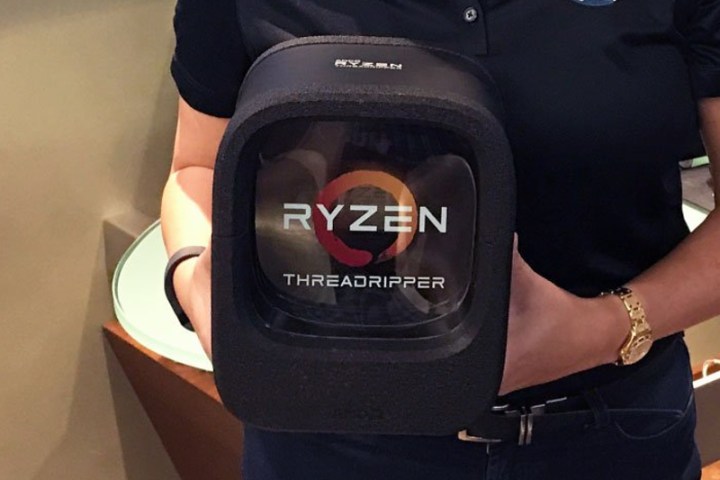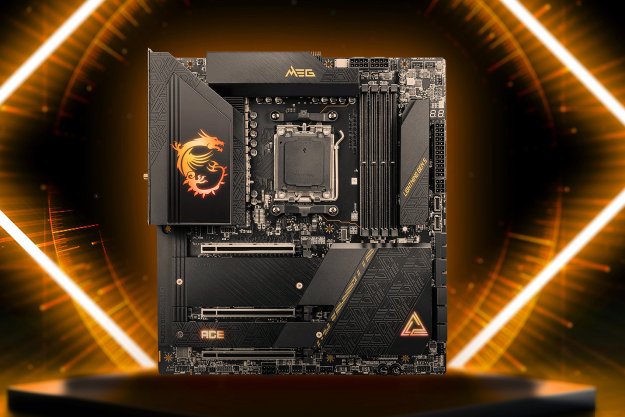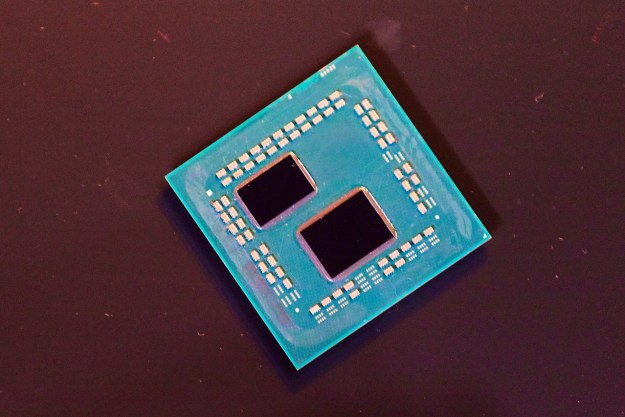
That said, here are all of AMD’s Ryzen Threadripper chips, with the unannounced 1920 model highlighted in bold:
| Cores / Threads |
Base Speed |
Boost Speed |
XFR Speed |
Power Usage |
Ship Date |
Price | |
| 1950X | 16 / 32 | 3.4GHz | 4.0GHz | 4.2GHz | 180 Watts | Aug. 10 | $999 |
| 1920X | 12 / 24 | 3.5GHz | 4.0GHz | 4.2GHz | 180 Watts | Aug. 10 | $799 |
| 1920 | 12 / 24 | 3.2GHz | 3.8GHz | ? | 140 Watts | ? | ? |
| 1900X | 8 / 16 | 3.8GHz | 4.0GHz | 4.2GHz | 180 Watts | Aug. 31 | $549 |
As the chart shows, it is another 12-core, 24-thread processor with the lowest base and boost speeds of the quartet. It also only draws 140 watts of power compared to the 180 watts used by the other three Threadripper models. It is very similar to the 1920X chip, using the same amount of L2 (6MB) and L3 (32MB) processor cache. The removal of the “X” in the name indicates that it may not have the Zen architecture’s Extended Frequency Range (XFR) feature enabled.
Once the chip hits the market, AMD will have two 12-core desktop processors competing against Intel’s single Core i9 12-core model arriving in September. Intel’s version will have a higher price tag than AMD’s two units but in return, it will have slightly faster boost speeds. Then again, the Intel chip’s base speed will be lower than what AMD’s two chips will offer.
Here is how all three stack up:
| Cores / Threads | Base Speed |
Boost Speed |
Maximum Speed |
Price | |
| 1920X | 12 / 24 | 3.5GHz | 4.0GHz | 4.2GHz | $799 |
| 1920 | 12 / 24 | 3.2GHz | 3.8GHz | ? | ? |
| I9-7920X | 12 / 24 | 2.9GHz | 4.3GHz | 4.4GHz | $1,199 |
AMD’s “epic” new Ryzen Threadripper processors will not fit in the company’s latest AM4 socket (seat) for desktop motherboards, but rather in its new, larger TR4 socket supporting 4,094 processor contacts (pins). By comparison, the AM4 motherboard socket used for AMD’s Ryzen 7, Ryzen 5, and Ryzen 3 desktop processors supports chips with only 1,331 physical contacts. Meanwhile, Intel’s latest X-Series processors rely on the LGA 2066 motherboard seat, which supports processors with 2,066 contacts.
Along with the TR4 socket, AMD is introducing a new motherboard chipset for its Ryzen Threadripper processors: the X399 chipset. They support a massive 66 PCI Express 3.0 lanes, up to eight sticks of four-channel DDR4 system memory, and up to 14 native USB 3.1 Gen1 ports. The chipset will support up to two native USB 3.1 Gen2 ports as well.
Here are the motherboards currently supporting AMD’s Ryzen Threadripper processors:
| ASRock: | Fatal1ty X399 Professional Gaming ($440) X399 Taichi ($340) |
| Asus | ROG X399 Zenith Extreme ($550) Prime X399-A ($350) ROG Strix X399-E ($400) |
| Gigabyte: | X399 Aorus Gaming 7 rev. 1.0 ($390) |
| MSI: | X399 Gaming Pro Carbon AC ($380) |
Editors' Recommendations
- The iPhone 15’s chip challenges Intel’s fastest desktop CPU — but there’s a catch
- CES 2023: AMD Ryzen 7000 laptops CPUs go up to 16 cores
- Head-to-head: Intel Core i7-12700H vs. AMD Ryzen 9 6900HS
- AMD Ryzen 9 7950X vs. Intel Core i9-12900K: Two flagships face off
- Upcoming AMD Ryzen 7000 CPU outperforms Zen 3 by up to 40%



